Relevant Overviews
Overview: Writing content
Relevant resources

Readability in user experience (UX) design refers to how easily users can read and understand textual content. It is crucial for a positive user experience as it directly impacts how effectively users can consume information on a website or application. Designers aim to enhance readability via appropriate presentation and language to make sure user
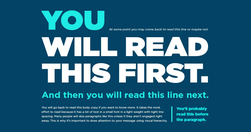
What grade level should you be writing at? How do you determine your copy’s grade level?
Verbs of Creation and ConstructionAssembleBuildConcoctCraftCultivateDesignEngineerFabricateForgeFormulateGenerateMoldProduceSculptSynthesizeWeaveVerbs of Sound and VoiceBellowBoomChirpCrackleGrowlHissHowlMurmurRoarRumbleScreamShriekSizzleSnapSqueakThunderTrillWarbleWhisperVerbs of Light and DarkBeamBlazeDazzleFlickerGlimmerGleamGlowIlluminateRadi…
Premature error messages, aggressively styled fields, and unnecessarily disruptive system-status messages feel bad-mannered and increase cognitive load for users during otherwise simple tasks.
UX Writing Top 20 practical tips to boost your designs 👇🔶 Be concise❌ You must log in to comment✅ Log in to comment🔶 Use active voice❌ The button should be clicked✅ Click the button🔶 Avoid jargon❌ System error (code 2234)✅ Log in error🔶 Be consistent❌ Add to cart vs. My bag✅ Add to bag vs. My bag🔶 Avoid double negatives❌ Unsubscribe not to receiv…

Bad writing can be avoided by following Orwell’s 6 little rules. The problem is the absolute nature of Orwell’s rules. The first five all include either a “never” or an “always”. That's why Orwell himself doesn’t always obey them and The Economist's Johnson revised them.

Websites and apps are our modern equivalent of phones. You create them so that people can serve themselves. Make your site or app a good conversational partner.

A UI/UX designer focuses on the appearance of an interface and how users will use said interface. A content-first designer, a.k.a., a content designer or UX writer, will focus on the content users will interact with.
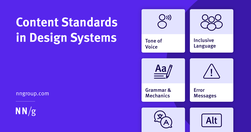
Content standards in design systems support a holistically consistent user experience and efficient collaboration between writers, content, and UI designers.

What does it mean to design for neurodiversity? We look at steps we can take to make content more accessible to more people.
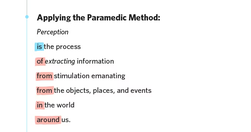
The root of the problem lies in our desire to impress. Thesaurus carpet-bombings and long-winded sentences are commonly mistaken for fine writing because they feel authoritative and intellectual. But they’re just masks; effective writing is lean, clean, and easy to read.
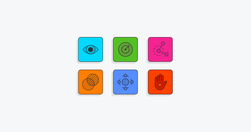
From providing accurate context to creating a cohesive structure, each of these key principles can elevate your content designs and ensure you’re communicating effectively with your audience
How to communicate effectively when users fail and succeed (shared on LinkedIn by Vitaly Friedman)

If you're a marketer, manager, developer, designer or writer wanting to up your UX writing game, then these guides are right up your alley.
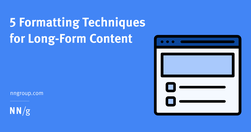
Techniques like summaries, bullet points, callouts, bolding, and helpful visuals improve comprehension and engagement with content exceeding 1,000 words.

People Don’t Read Online—They Scan. This Is How to Write for Them Scanning is searching. Reader’s behavior when scanning may seem pure laziness, but it’s not. It’s an efficient strategy to seek out and filter information. Scanning also allows readers to avoid informational overload.

How writing reframes our knowledge and drives our decisions. Our message is effectively drowning in a sea of organizational and semantic noise that is part and parcel of the product itself. how do we make this easier on the user? Nope… not empathy. Writing. Writing about anything presupposes some degree of understanding of the context.
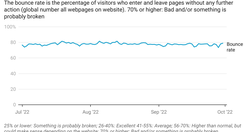
This blog post was submitted to online course "Professional Communication: Business Writing and Storytelling" (Economist Education) . It was then adapted and used on an intranet. "Easy writing makes hard reading" - Ernest Hemingway "The discipline of the written word punishes both stupidity and dishonesty" - John Steinbeck

Five texts that explain how to write simply and well: 1 Politics and the English Language - 2 Style: Lessons in Clarity and Grace - 3 On Writing Well: The Classic Guide to Writing Nonfiction - 4 The Sense of Style: The Thinking Person’s Guide to Writing in the 21st Century - 5 Merriam-Webster’s Dictionary of English Usage.

A good design process: How is someone navigating through it? How are these things co-located together? Which pages are we grouping together? Can people find them? ... less attached to the tone of voice and more interested in simplicity and utility ... more like an architect than a prose-writer, putting LEGO blocks together in the most useful w…

ProPublica’s plain language experiment is a first for a mainstream news organization. Disability experts say it shouldn’t be the last.

An examination of translating text to make it as accessible as possible. Looking at how to make writing easier to read

Easy-to-read information is important for people with intellectual disabilities. It is important so they can: Learn new things. Take part in society. Know their rights and stand up for them. Make their own choices.
What makes a text nice to read? To know more about this, it is important to take a closer look at how people are reading. Additionally, it may be the case that someone is impaired, physically or mentally, to read a text. How does it work?
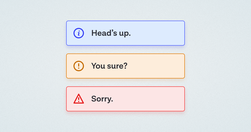
A while back, in the early days of our design system, we had a ticket for a component sitting in our backlog, with the title “Alert.” My initial reaction was “Oh yeah, a colored box with a little icon to the left of it and some text, easy.” Oh dear reader, how naive I was…

After all, we’ve changed dramatically as a news consuming public over the decades; think about how Twitter threads, TikTok videos, and interactive graphics have all burrowed their way into our news habits. Why shouldn’t our most basic story form change as well?

Financial writing is full of jargon and complexity. But a series of research suggests that investors are drawn to simple, clear writing with short sentences. The simple reason is that complex writing is off-putting — people tune out and find it dull, a fact confirmed by neuroscience research.

In this guide, I’m going to teach you my step-by-step process for writing high-converting website copy.

The smaller the word count (and in general, the more concise your online communication), the more users will comprehend and retain your message.

Aaron Berman shared some useful writing tips for anyone writing on complex issues that he learned writing the (US) President's Daily Briefs. Check out the five tips below, illustrated with examples from Star Wars and Star Trek.